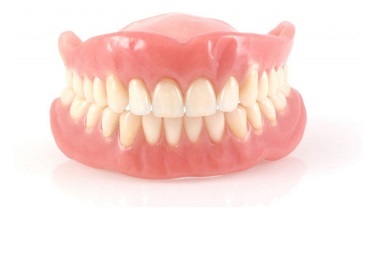Dentures are prosthetic devices made for replacing lost tooth. Those are of two types-:
a) Complete Denture
b) Partial Denture


What are Conventional Dentures?
These dentures are ready for placement in the mouth about 8-12 weeks after the teeth have been removed and gums healed. Consult us for cost of complete dentures in India.
What are Immediate Dentures?
Unlike conventional dentures, these on the other hand are made in advance and can be placed as soon as the teeth are removed. As a result, the patient does not have to be without teeth during the healing period. However with time, the bones and gums resorb. Therefore keep in mind that they require more adjustments (denture relines) to fit properly during the healing process months. These dentures are a temporary solution until conventional dentures can be made.
What are the alternatives to removable dentures?
Nowadays dental implants and bridges are the preferred method for replacing teeth in a fixed or permanent way. Implants more closely resemble the feel of real teeth but the cost is usually greater. Consult us if you're looking for teeth replacement treatment in Bhubaneswar.
What are the adjustments needed to a new denture?
Getting used to new dentures can take sometime. Denture problems are common, especially in the early days after fitting. Even the very best made dentures are foreign to your mouth and will feel as such for the first few weeks. Tongue, lips, cheeks, gums and any natural teeth all need time to get used to new dentures.
Denture Irritation : minor irritation and sore spots is a common problem with new dentures. Your dentist can make adjustments at the review appointments to relieve the pressure spots.
Denture Fit : dentures may feel a little loose at first, especially lower complete dentures. It takes sometime for the dentures to 'bed-in'.
Eating with Dentures : start with liquids and soft foods such as soups, bread and eggs. Avoid hard food stuffs in the beginning. Build-up your exposure to these harder foods over time, once you are more comfortable. Have patience and stick to it ! You will soon master eating more difficult foods.
Speaking with Dentures : speaking normally will take practice. The first few days are the most difficult. The dentures themselves will feel awkward to speak with. This problem will also be compounded by increased saliva flow in the first few days, and then things will settle.
Home Care Instructions
Full dentures require proper care to keep them clean, free from stains and looking their best. For good denture care:
Remove and rinse dentures after eating
Handle your dentures carefully
Rinse your mouth after removing your dentures
Brush your dentures daily by soaking and brushing with a non-abrasive denture cleanser to remove food, plaque and other deposits
Soak dentures overnight
Rinse dentures before putting them back in your mouth, especially if using a denture soaking solution
Schedule regular dental check-ups
